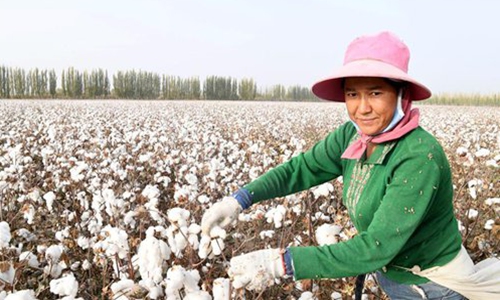HOME >> OPINION
Cotton industry symbolizes Xinjiang’s human rights
By Yu Ning Source:Global Times Published: 2019/11/14 22:53:40

A woman works in a cotton field in Awat County, Northwest China's Xinjiang Uyghur Autonomous Region, October 25, 2019. Photo: Xinhua
Cotton is the latest tool some Western media outlets, human rights groups and observers use to slander the human rights situation in Northwest China's Xinjiang Uyghur Autonomous Region. Claiming that cotton products from Xinjiang are tainted by the "forced labor" of Uyghurs, they are demanding that global brands, such as Japanese retailers Muji and Uniqlo, stop buying cotton from their Xinjiang-based suppliers."You can't be sure that you don't have coerced labor in your supply chain if you do cotton business in China," Nathan Ruser, a researcher at the Australian Strategic Policy Institute, was quoted as saying in a BBC report on Wednesday.
Does cotton symbolize human rights violations or improved human rights in Xinjiang? Let's take a look at what has happened to the region's cotton and textile industry in recent years.
Xinjiang is China's largest cotton production base, accounting for over 80 percent of China's total cotton output. Thanks to good natural ecological conditions and agricultural modernization, the region boasts top-quality cotton and high-efficiency in production. According to a national plan, the cotton-rich region will be built into a major textile and clothing manufacturing base by 2020. Stimulated by preferential policies from the central and regional governments, an increasing number of textile companies have moved to the autonomous region from across the country, creating hundreds of thousands of jobs and boosting the livelihood of local people. It's expected that 1 million jobs will be created by 2023.
Claims that cotton is produced by forced labor in Xinjiang are based on speculations that Uyghurs in the region's vocational education and training centers, what the West calls "reeducation camp," were "persecuted" and "forced to do unpaid labor." But the reality is in those centers, as many foreign diplomats, media people and scholars who visited there have seen, trainees learn language, basic law and working skills that would help them return to society.
Val Thompson, founder and publisher of the Houston-based International Focus Magazine, wrote after interviewing the trainees: "I interviewed several of them; they seemed very happy… For those who want to believe these young people may have been coerced, I say you can't fake happiness; and happiness is exactly what I saw."
Many Western countries and organizations deliberately turn a blind eye to that fact. They are in no position to talk about human rights with China. Cotton, in the history of Western imperial expansion, was a symbol of Western encroachment on human rights. Many Asian, African, and Latin American farmers were forcibly turned into farm laborers on white-owned cotton plantations. But what the plant has brought to Xinjiang benefits the local people.
For nearly three years, no violent terrorist attacks have taken place in Xinjiang. Local people's livelihood, boosted by industries such as agriculture, energy and textile, continues to improve. The Xinjiang autonomous region's per capita GDP was 49,000 yuan ($6,879) in 2018, more than three times that of India, one of the world's largest cotton producers. Isn't this the greatest achievement in human rights protection in Xinjiang?
More foreign enterprises are welcome to enter the cotton business in Xinjiang and contribute to the region's human rights development.
Posted in: OBSERVER